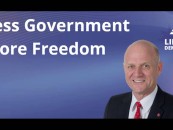Once again, the government has been getting its knickers in a knot over climate change. And once again, despite three politically shrewd options to choose from, it is choosing a dumb fourth option.
The first of the shrewd options is to withdraw from the Paris Agreement and abandon the pledge to force our emissions in 2030 to be 26 per cent to 28 per cent lower than emissions in 2005.
In the process, the government could announce it would commit to reduce emissions as part of an enforceable international agreement based on equal effort, but that the Paris Agreement is neither enforceable nor based on equal effort. This option would enable the government to abolish the renewable energy target, the Emissions Reduction Fund, the Australian Renewable Energy Agency, the Clean Energy Finance Corporation and the Clean Energy Innovation Fund. It would save taxpayers at least $150 million across the next three years and would cut electricity bills. What’s more, there would be no need to introduce a carbon price.
The second option is to stick with the Paris Agreement but better align our planned emission reductions with the pledges of the world’s big emitters.
India, China, Iran, Saudi Arabia and Indonesia each pledge to more than double their emissions from 2005 to 2030. Russia and Brazil each pledge to increase their emissions by a third. Mexico also pledges increased emissions, while South Korea and South Africa pledge that their emissions in 2030 will be much the same as in 2005. Japan pledges to reduce its emissions, but to a lesser extent than Australia. The only pledges that exceed Australia’s planned effort come from Barack Obama’s US, Justin Trudeau’s Canada, and the EU of Francois Hollande and Angela Merkel.
Option two is based on the idea that each country should make a comparable effort to reduce emissions because all will suffer from rising global temperatures. (Indeed, it would be reasonable to expect countries that might suffer less from rising temperatures, such as Russia, to go to less effort to reduce emissions.)
Arguments that poor countries should be spared from the costs of reducing emissions are just flimsy arguments for foreign aid. The industrial revolution that brought great wealth to the West has also lifted much of the rest of the world out of poverty. So if the industrial revolution is causing climate change, then the responsibility to respond rests with every nation.
Option two would require the retention of some of the present policies to reduce emissions, but at least it would avoid the need for the introduction of a carbon price.
Unfortunately, Malcolm Turnbull and the average voter probably couldn’t face up to the realpolitik underpinning options one or two. The warm and fuzzy feelings surrounding Australian emission reductions are just too addictive. But there remains an option that, while more harmful to Australians than options one or two, is still politically shrewd.
Under option three, a carbon tax would be used to fund high-end income tax cuts, while all other programs to cut emissions would be abolished. In addition, nuclear power would be legalised.
Devoting all the proceeds of a carbon tax to fund cuts to top personal tax rates and the company tax rate would make Australia more competitive, boost investment, reverse the brain drain and create jobs. Moreover, as an emissions-free source of baseload power, nuclear power has no equal. The only ones who would not like it are those who hate the rich and those who choose to ignore France’s nuclear success.
Abolition of bureaucratic programs such as the renewable energy target would make it impossible to establish new projects such as wind farms and solar arrays unless they were competitive without subsidies from other forms of generation.
But despite the government having three politically shrewd options, the Prime Minister seems to be fixated on option four: to do nothing. He is keeping us signed up to the unenforceable Paris Agreement, sticking to an emissions reduction target that is out of step with the world’s big emitters, and tying himself to costly policies such as the renewable energy target that the Greens love but Coalition supporters hate.
If only he were more agile and innovative.
David Leyonhjelm is a senator representing the Liberal Democratic Party.
First Published in The Australian









